
When selecting windows for your home, the choice of frame material can significantly impact both the performance and aesthetic appeal of your windows. Each material offers unique advantages and drawbacks, and the right choice depends on your specific needs, preferences, and budget. In this comprehensive guide, we’ll delve into the characteristics of six popular window frame materials: wood, vinyl, uPVC, fiberglass, composite, and aluminum.

Pros:
Cons:

Pros:
Cons:

Pros:
Cons:

Pros:
Cons:

Pros:
Cons:

Pros:
Cons:
Selecting the right window frame material is a crucial decision that can significantly impact the look, performance, and value of your home. Whether you prioritize the natural beauty and insulation of wood, the affordability and low maintenance of vinyl, the durability and strength of fiberglass, or the sleek design of aluminum, understanding the differences between these materials will help you make an informed choice. Consider your specific needs, climate, and budget when making your decision, and you’ll be well on your way to enhancing your home’s comfort and curb appeal.
Try our advanced search feature, where you can explore over a dozen manufacturers and more than 70 window lines. Our comprehensive search allows you to compare different window options tailored to your specific needs. Start your search now and discover the best windows for your home!
Click below to try our advanced window search!
